(In Memoriam) Fernando Gomez-Pinilla, PhD

In Memoriam
Fernando Gómez-Pinilla, Ph.D. (1953-2025) passed away unexpectedly on December 29, 2025. Dr. Gómez-Pinilla was a Professor of Neurosurgery having a secondary appointment in Integrative Biology and Physiology. His career at UCLA lasted for over 30 years, beginning in the late 1980s when he became interested in neuroplasticity. Along with Professor Jaime Villablanca, he reported the enhanced sprouting of neuronal connections and the decrease of neuronal degeneration following damage to the cerebral cortex when the damage occurs early in life as compared to adulthood. He went on to become interested in the mechanisms of neural repair and the role of trophic factors on activity-dependent plasticity. As his research progressed, he put his energy into identifying the mechanisms by which environmental factors affect neuronal health. He reported that trophic factors endogenous to the brain and spinal cord can be enhanced by the practice of select behaviors. From this work it appears that physical activity, learning, and nutritional factors control neurotrophins in the brain. Dr. Gómez-Pinilla’s findings have opened the exciting possibility that regulation of trophic factors by behavior may be a pivotal mechanism by which specific experiences can impact on the structure and function of the CNS. This work may account for the improvement of CNS function after trauma provided by rehabilitative therapies. More recently, he collaborated with other faculty in the Department of Neurosurgery exploring the potential of imaging of neuroplasticity, thereby, providing important insight into the applications of his findings to the treatment of recovery of function after traumatic brain injury.
Dr. Gómez Pinilla earned a BA (1977) and MS in Neurobiology (1979) at the University of Chile. In 1986, he obtained his Ph.D. in Anatomy and Cell Biology at UCLA. He completed a postdoctoral fellowship at the Institute of Brain Aging and Dementia at UC Irvine (1986-1993) in the Department of Psychobiology. He was subsequently appointed Assistant Professor Adjunct at UC Irvine, Department of Neurology (1993-1998). He returned to UCLA in 1998 and had multiple appointments in the Department of Physiological Science (1998-2004), Department of Neurosurgery (2001-2025), and the Department of Integrative Biology and Physiology (2004-20025).
He held memberships with the National Neurotrauma Society, the Society for Neuroscience, the Brain Research Institute at UCLA, the American and Canadian Association of Anatomists, the International Brain Research Organization, the British Brain Research Association, and the European Brain and Behavior Society.
Dr. Gómez Pinilla was preceded in death by his wife, Ana Gajardo. He is survived by a son, Alexis Gómez, and granddaughter who reside in Detroit, MI.